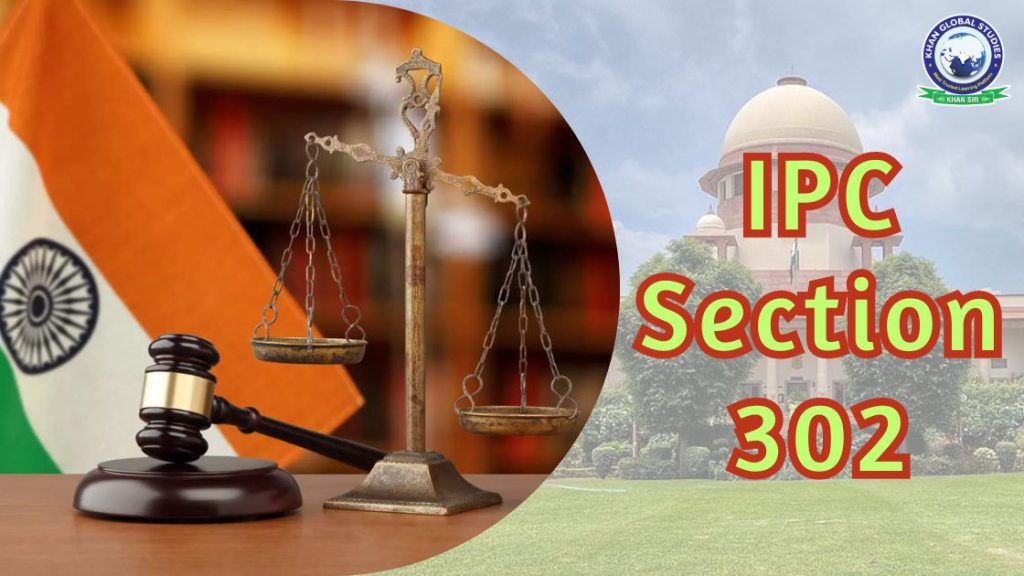There is still no correct information about Section 302. Let’s discuss what is IPC Section 302 and what its penalties. Section 302 of the Indian Penal Code is important in several ways. Persons accused of murder are prosecuted under this section.
Details of IPC Section 302
| Definition of Section 302 | Whoever murders any person shall be punished with the death penalty or imprisonment for life as well as with a fine. |
| Applicable Crime | Killing |
| Punishment | Death Penalty or Life Imprisonment + Fine |
| Speciality | It is a non-bailable, cognisable offence and can be tried by the Court of Session. This crime is not negotiable. |
Indian Penal Code Section 302 (Punishment for murder)
- Whoever committed the murder would be punished with life imprisonment or the death penalty (depending on the seriousness of the murder) along with a fine.
- The primary point of consideration for the Court in cases relating to murder is the intention and purpose of the accused. Therefore, the motive and intention of the accused must be proved in cases under this section.
- It is a non-bailable and cognisable offence that is tried by the District and Sessions Judge.
- This crime is not negotiable in any way.
- Murder is defined under section 299 of the IPC.
Section 302 does not apply in Some Cases
Certain provisions of Section 302 are given in the Indian Penal Code and Section 302 can be applied only when a case fulfils all the conditions of the provisions of this section. If the tax is not fully known then any other section other than Section 302 can be used, but Section 302 cannot be used.
In Section 302, the court takes into account the intention of the person committing murder, but there are some cases in which a person kills another person, but the murderer does not intend to kill. Is.
Therefore in all such cases, Section 304 of the Indian Penal Code is used instead of Section 302. Section 304 provides certain provisions for the punishment of homicide, providing that whoever murders a human being shall be punished with imprisonment for the same term. Death Penalty. Lifelong imprisonment or imprisonment up to 10 years and a fine.
What is the minimum period of bail if charged under Section 302?
There is no prescribed time limit under the Indian Penal Code for granting bail if you have been charged under Section 302. The case under section 302 of IPC is a very serious crime and getting bail is not an easy task if you are accused of murder. Whether an accused can get bail in a murder case depends largely on the facts and circumstances of the case. Moreover, if the evidence given against the accused is very strong, it will further delay the bail process.
As per the recent observation of the Supreme Court, if an offence involves the death penalty, the period of investigation will be 90 days irrespective of the minimum punishment. Similarly, if the offence is punishable with life imprisonment, even if the minimum sentence provided is less than 10 years, the period of custody before ‘default bail’ becomes available will be 90 days. Therefore, if a person is accused of an offence punishable with death or life imprisonment but with a minimum imprisonment of fewer than 10 years, 90 days will also apply.
The Supreme Court of India recently held that an accused is entitled to criminal process bail under Section 167(2)(a)(2) of the Code of Criminal Procedure if he has committed an offence punishable with imprisonment up to 10 years. , failed to file the charge sheet within a few days.
In all cases where the minimum punishment is less than 10 years but the maximum punishment is not death or life imprisonment, Section 167 (2) (a) (ii) will apply and thereafter the accused will be entitled to grant ‘default bail’—60 days of the case registered in the charge sheet.
What to do if a bail application under Indian Penal Code 302 is rejected by the court?
As stated above, getting bail on murder charges is not an easy task. There may be instances where your bail application may be rejected. However, if you have applied for bail and your bail application has been rejected, you have the option to file a review petition before the judge to review the order rejecting the bail application. Additionally, if you feel that your case has merit, you can also challenge the order in the High Court. If you have any new grounds on which you are seeking bail, you can file a second bail petition.
What is the procedure for appealing a murder conviction?
- In a criminal case, the government cannot appeal if the plaintiff is found not guilty. If found guilty, the defendant can appeal. Both parties in a criminal case can appeal the court’s decision regarding sentencing.
- The time taken by the appellant to file the appeal and complete other paperwork is also a factor.
- After all the processes, the appeal takes an average of 20 months to complete. If you’re lucky, your procedure may be completed in just a few weeks. But this happens very rarely.
- The Appellant must show that the trial court committed a legal error that affected the decision in the case. The appellant must prepare a written document or brief discussing the legal argument. In sum, the appellants show why the trial court’s judgment should be reversed. The appellants cite previous court cases to support their claim.
- A panel of three judges renders a verdict based on the written record of the case, briefs presented by the parties, and possibly oral arguments in the trial court.
- You will need lawyers experienced in criminal defence to make these arguments. Despite the best efforts of the appellants, very few appeals are successful. But don’t let that stop you from giving it a try.
FAQs
Q: What is the offence under section 302 of IPC?
A: IPC Section 302 Crime: Murder
Q: What is the punishment in the case of section 302 of IPC?
A: In the case of section 302 of IPC, there is a provision of death or life imprisonment + fine.
Q: Is Section 302 of IPC a cognizable offence or a non-cognizable offence?
A: Section 302 of IPC is cognizable.
Q: How to register your case for the offence under section 302 of IPC?
A: Use Lorato to get information about the best criminal lawyers near you for defence in IPC Section 302 cases.
Q: Is Section 302 of IPC a bailable offence or non-bailable?
A: Section 302 of IPC is non-bailable.
Q: In which court can a case be presented under section 302 of IPC?
A: The case can be presented in the sessions court under section 302 of the IPC.





